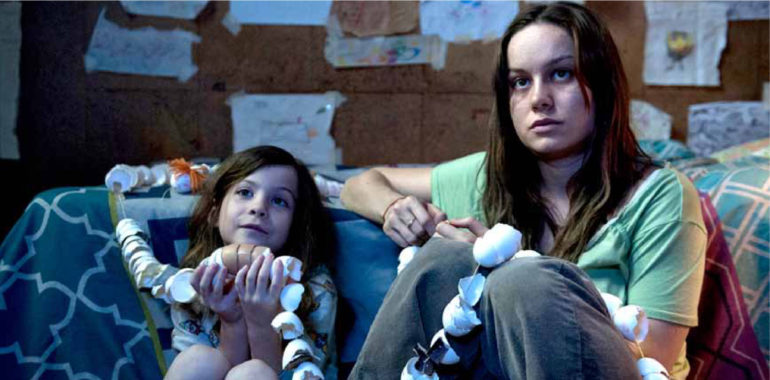Room is a film about the little details. It opens on close-ups of everyday things. The rim of a dish. The wrinkles in a piece of tinfoil. They slowly come into focus as we discover this is the point of view of Jack (Jacob Tremblay). Jack can find fascination in most anything. Then again, he’s been locked in a tiny run-down room for all five years of his life; the little details become crucial.”
Emma Donoghue’s 2011 source novel was a torn-from-the-headlines hit, inspired by such cases as the Kampusch kidnapping and the Fritzl family. Beyond the potential salaciousness of the material, Donoghue created an emotionally-fraught family drama as Jack and his mother (affectionately called ‘Ma’) suffer years of forced imprisonment. For the big screen adaptation, Donoghue has been trusted to bring the best of the book to the film, and she largely succeeds. After a brief epilogue, in which Jack lends voiceover to his own birth, the film opens proper on Jack’s fifth birthday. He’s been promised a birthday cake by Ma (Brie Larson), something the likes of which he’s only been exposed to via the miracle of their television. Their world is so minimal that he addresses the furniture by name (“Good morning, Wardrobe”, “Hello, Rug”). The location offers director Lenny Abrahamson many interesting opportunities. As in the novel, the film is told from Jack’s point of view, so Abrahamson keeps the camera at that POV as often as he can. A scene in which Ma gets Jack to run between the walls of their small prison shows the limits of their world; the camera pans back and forth as Jack darts from one side of Room to another. The limitations are laid down; here we are, and for the next hour this is all we can know. We feel the darkness when the power goes out, and a mousey interloper is the height of excitement for Jack.
Immersion in Jack’s point of view is helpful when his mother’s captor Old Nick (Sean Bridgers) comes for his nightly visit. The brutal realities are kept from Jack (He sleeps in the closed wardrobe at night), and we get just enough information to get by. Donoghue’s script doesn’t delve into too much details unless it really needs to. Besides sparing the film an unnecessary leeriness, it pins our focus squarely on Jack and Ma, and the two performances. As this most patient of mothers, Larson is wonderful. She’s by turns energetic and resigned, but there’s never any doubt that she loves her boy. We believe in her turmoil, and as we’re looking at her from Jack’s standpoint, it’s impossible not to love the character. It’s also easy to see why she’s do most anything for her child. Tremblay is a revelation as Jack; in one of the finest child performances in years, he’s astonishingly naturalistic. He never feels over-rehearsed or overly precocious; he’s just a little boy who’s about to learn what the world is really about. After years of imprisonment, Ma begins to teach Jack the truth about their Room and the real world, in anticipation of a daring escape. Jack’s eyes widen as he struggles to comprehend that reality is just that, but Abrahamson brings his combination of frustration and joy to life.
It’s at the point of escape, about the halfway point of the film, that Room changes tack. Spoiling as little as possible, Ma and Jack get out of Room to adjust to a new life beyond its borders. It’s a huge change, and both the characters and direction struggle to cope. Both were defined by the limitations of Room, so the real world inspires a certain amount of frustration. The reactions of Jack’s grandparents (Joan Allen and William H. Macy) to their daughter’s return differ wildly, and the ongoing psychological effects take their toll on all concerned. The second half of Room works because Donoghue and the cast bring out the characters’ turmoil better than Abrahamson does. Perhaps Frank‘s rebellious nature spoiled us, but even if the camera’s not doing anything too interesting, Abrahamson ensures Larson and Tremblay are still delivering torrents of palpable emotion. One of the most memorable scenes is just Jack smiling at the sight of Grandma’s friend Leo’s (Tom McCamus) pet dog. That smile, as small a detail as it may seem, is the heart and soul of Room, and the film works overall because that smile, and that joy, must survive.
Room is due for release in Irish cinemas on 15th January 2016.

